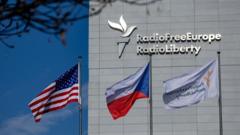The move comes as U.S. foreign policy increasingly grows unfavorable to independent journalism. Foreign Minister Jan Lipavsky emphasized the importance of RFE/RL, stating it represents one of the most reliable sources of information in authoritarian nations such as Iran, Belarus, and Afghanistan. Historically, the U.S.-funded broadcaster reached millions during the Cold War, serving as a vital medium for spreading democratic ideals under oppressive regimes that heavily censored local media outlets.
Controversially, Elon Musk, now overseeing budget reductions under former President Trump, previously labeled RFE/RL as an irrelevant entity, suggesting it squandered taxpayer dollars. This perspective was strongly rebuked by RFE/RL's president and CEO Stephen Capus, who warned that eliminating the organization’s funding would be detrimental, potentially benefiting adversarial states that oppose U.S. interests. His sentiments were shared by the Committee to Protect Journalists, who raised alarms about how the funding cuts could endanger the lives of journalists working in oppressive environments.
With an existing weekly audience of nearly 50 million across 23 countries—including Russia, Ukraine, Iran, and various Central Asian states—Lipavsky expressed hopes to collaborate with other EU officials to safeguard the broadcaster’s operations. This initiative contrasts sharply with funding practices in countries like Russia and China, which continue to enhance their state-controlled media apparatuses in their competition against Western liberal narratives.
In the U.S., the implications of these cuts are severe. Reports indicate that most of the Voice of America’s personnel have been placed on administrative leave, and many contracted jobs in non-English services face elimination. The uncertainty surrounding U.S. media aid has emerged as a complex issue amid broader shifts in international relations and media influence.
As the Czech Republic seeks to rally EU support for RFE/RL, the future of independent journalism at a global scale hangs in the balance, highlighting the ongoing struggle between state-controlled narratives and the vital freedoms of the press.
Controversially, Elon Musk, now overseeing budget reductions under former President Trump, previously labeled RFE/RL as an irrelevant entity, suggesting it squandered taxpayer dollars. This perspective was strongly rebuked by RFE/RL's president and CEO Stephen Capus, who warned that eliminating the organization’s funding would be detrimental, potentially benefiting adversarial states that oppose U.S. interests. His sentiments were shared by the Committee to Protect Journalists, who raised alarms about how the funding cuts could endanger the lives of journalists working in oppressive environments.
With an existing weekly audience of nearly 50 million across 23 countries—including Russia, Ukraine, Iran, and various Central Asian states—Lipavsky expressed hopes to collaborate with other EU officials to safeguard the broadcaster’s operations. This initiative contrasts sharply with funding practices in countries like Russia and China, which continue to enhance their state-controlled media apparatuses in their competition against Western liberal narratives.
In the U.S., the implications of these cuts are severe. Reports indicate that most of the Voice of America’s personnel have been placed on administrative leave, and many contracted jobs in non-English services face elimination. The uncertainty surrounding U.S. media aid has emerged as a complex issue amid broader shifts in international relations and media influence.
As the Czech Republic seeks to rally EU support for RFE/RL, the future of independent journalism at a global scale hangs in the balance, highlighting the ongoing struggle between state-controlled narratives and the vital freedoms of the press.




















